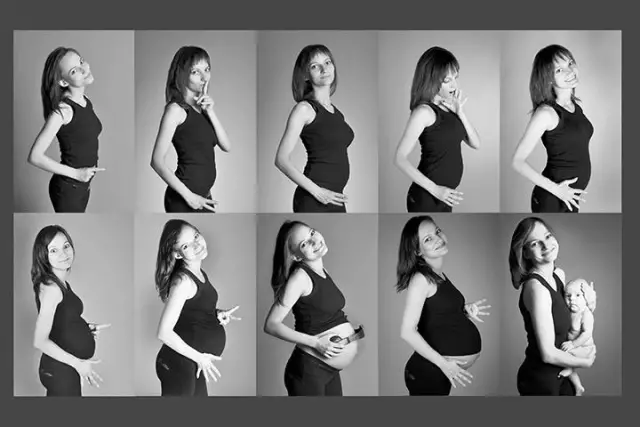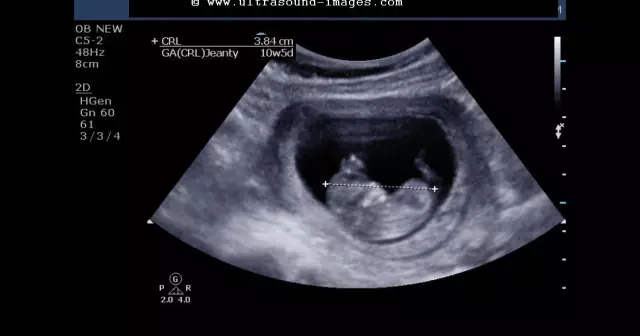- Author Rachel Wainwright wainwright@abchealthonline.com.
- Public 2023-12-15 07:39.
- Last modified 2025-11-02 20:14.
26 weeks pregnant

At the 26th week of pregnancy, the unborn baby turns 24 weeks from the time of conception, the seventh lunar month of pregnancy is in progress.
Changes in the fetus
With the help of ultrasound at the 26th week of pregnancy, you can find out that the future baby has already reached a length of about 35 cm, and a mass of 750 - 850 g.
In the fetus, individual facial features are already clearly distinguishable, characteristic only for him. On the face of the unborn child, there are eyelashes and eyebrows, auricles, a small nose, and the cheeks begin to round. The ears protrude a little, they are still soft due to the underdevelopment of the cartilage that makes up their base.
The senses continue to develop - the inner ear, sight, touch. For the fetus at the 26th week of pregnancy, the beat of the mother's heart is very familiar and familiar, it calms him down. The future baby is distinguished by light and darkness, feeling the umbilical cord and parts of his body with his fingers. It is believed that at 26 weeks of gestation, he distinguishes between the voices of the father and mother.
The eyes of the unborn baby at 26 weeks of gestation are formed, but he does not open them yet. The color of the iris is already predefined.
The connection between the brain and the adrenal cortex is being established - the process of hormone formation becomes controlled by the pituitary gland and hypothalamus. In addition, its own growth hormone begins to be produced.
The lungs of the fetus at 26 weeks of gestation take their usual place, the pulmonary respiratory sacs (alveoli) become more and more, which increases the survival rate in case of premature birth.
The fetal movements are so active that they can cause pain at 26 weeks of gestation. If a woman feels regular tremors and movements in her abdomen at 24 weeks of pregnancy, then everything is in order with her unborn child. Approximately from this time, other people can feel the baby's movements, putting their palm to their stomach. If there is no feeling of movement in the abdomen at 26 weeks of gestation for more than 12 hours in a row, you should consult a doctor.
Changes in a woman's body at 26 weeks of gestation
The height of the fundus of the uterus above the level of the pubic joint is now normally about 26 cm, or 6 cm above the navel.

The increase in weight and abdominal circumference at 26 weeks of gestation inevitably affects the woman's rapid fatigue. Sometimes fatigue is accompanied by unpleasant painful sensations in the lower back. This is due to a change in the center of gravity of the body and the softening effect of pregnancy hormones on the ligaments of the joints. Such pains at 26 weeks of pregnancy are natural, and you can fight them. Experts recommend resting more often, taking a horizontal position, not lifting weights and wearing comfortable shoes with low heels.
By this time, the breast of a pregnant woman has increased in size. The discharge of a few drops of colostrum from the nipples at 26 weeks of gestation is a sign that the breast is preparing for breastfeeding after childbirth. On the areolas around the nipples, protruding tubercles may appear, and the areolae themselves darken - so you should not be afraid.
Examination at 26 weeks of gestation
At this time, hemoglobin may decrease, which is reflected in the general blood test. This is not surprising, since the volume of circulating blood has increased by almost one and a half times. A decrease in hemoglobin below 110 g / l should not be allowed, since with anemia, not only the woman's well-being worsens, but the fetus may also suffer from oxygen starvation.
For the entire pregnancy up to 26 weeks, the total weight gain should not exceed 10 kg. Excessive and too fast weight gain testifies in favor of latent gestosis (toxicosis of the second half of pregnancy). It is best to control your weight daily, on an empty stomach, at the same time.
YouTube video related to the article:
Found a mistake in the text? Select it and press Ctrl + Enter.






